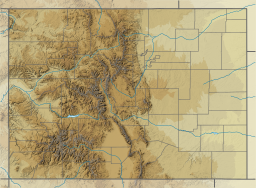Marston Lake is a reservoir in Denver, Colorado. It is owned by Denver Water and was completed in 1902.[2] The reservoir sends water to the Marston treatment plant, and from there the water is distributed to Denver residents.
| Marston Lake[1] | |
|---|---|
 The lake in 2016. | |
| Location | Denver, Colorado |
| Coordinates | 39°37′48″N 105°04′04″W / 39.63000°N 105.06778°W |
| Primary inflows | South Platte River |
| Basin countries | United States |
| Managing agency | Denver Water |
| Water volume | 19,795 acre⋅ft (24,417,000 m3) |
| Surface elevation | 5,525 ft (1,684 m) |
The reservoir receives water from the South Platte River. The river receives water from the Colorado Western Slope through a transmountain diversion via the Roberts Tunnel.
Climate
editAccording to the Köppen Climate Classification system, Marston Lake has a cold semi-arid climate, abbreviated "BSk" on climate maps. The hottest temperature recorded at Marston Lake was 104 °F (40 °C) on July 18, 1998, while the coldest temperature recorded was −19 °F (−28 °C) on December 31, 2014.[3]
| Climate data for Marston Filter Plant, Colorado, 1991–2020 normals, extremes 1998–present | |||||||||||||
|---|---|---|---|---|---|---|---|---|---|---|---|---|---|
| Month | Jan | Feb | Mar | Apr | May | Jun | Jul | Aug | Sep | Oct | Nov | Dec | Year |
| Record high °F (°C) | 72 (22) |
77 (25) |
81 (27) |
84 (29) |
96 (36) |
100 (38) |
102 (39) |
104 (40) |
97 (36) |
87 (31) |
80 (27) |
73 (23) |
104 (40) |
| Mean maximum °F (°C) | 65.5 (18.6) |
66.7 (19.3) |
74.5 (23.6) |
78.4 (25.8) |
85.1 (29.5) |
95.2 (35.1) |
96.6 (35.9) |
94.4 (34.7) |
91.8 (33.2) |
82.3 (27.9) |
74.4 (23.6) |
65.5 (18.6) |
97.7 (36.5) |
| Mean daily maximum °F (°C) | 45.8 (7.7) |
46.5 (8.1) |
54.6 (12.6) |
60.1 (15.6) |
69.0 (20.6) |
80.8 (27.1) |
86.4 (30.2) |
85.0 (29.4) |
77.2 (25.1) |
64.2 (17.9) |
53.4 (11.9) |
45.4 (7.4) |
64.0 (17.8) |
| Daily mean °F (°C) | 32.6 (0.3) |
33.4 (0.8) |
41.3 (5.2) |
47.3 (8.5) |
56.4 (13.6) |
67.1 (19.5) |
73.0 (22.8) |
71.3 (21.8) |
63.0 (17.2) |
50.4 (10.2) |
40.6 (4.8) |
32.8 (0.4) |
50.8 (10.4) |
| Mean daily minimum °F (°C) | 19.3 (−7.1) |
20.3 (−6.5) |
28.1 (−2.2) |
34.5 (1.4) |
43.8 (6.6) |
53.4 (11.9) |
59.5 (15.3) |
57.5 (14.2) |
48.7 (9.3) |
36.7 (2.6) |
27.7 (−2.4) |
20.2 (−6.6) |
37.5 (3.0) |
| Mean minimum °F (°C) | 0.0 (−17.8) |
−0.3 (−17.9) |
12.1 (−11.1) |
20.5 (−6.4) |
29.9 (−1.2) |
44.1 (6.7) |
53.1 (11.7) |
49.1 (9.5) |
38.3 (3.5) |
21.8 (−5.7) |
11.7 (−11.3) |
−1.7 (−18.7) |
−7.6 (−22.0) |
| Record low °F (°C) | −8 (−22) |
−16 (−27) |
−6 (−21) |
6 (−14) |
15 (−9) |
31 (−1) |
49 (9) |
42 (6) |
29 (−2) |
7 (−14) |
−6 (−21) |
−19 (−28) |
−19 (−28) |
| Average precipitation inches (mm) | 0.48 (12) |
0.67 (17) |
1.19 (30) |
2.07 (53) |
2.73 (69) |
1.87 (47) |
2.05 (52) |
1.85 (47) |
1.26 (32) |
1.04 (26) |
0.74 (19) |
0.61 (15) |
16.56 (419) |
| Average snowfall inches (cm) | 6.3 (16) |
6.2 (16) |
5.4 (14) |
4.1 (10) |
0.8 (2.0) |
0.0 (0.0) |
0.0 (0.0) |
0.0 (0.0) |
0.0 (0.0) |
1.7 (4.3) |
3.7 (9.4) |
5.9 (15) |
34.1 (86.7) |
| Average precipitation days (≥ 0.01 in) | 4.1 | 4.4 | 5.1 | 7.2 | 9.8 | 7.7 | 8.3 | 9.0 | 6.0 | 5.1 | 3.7 | 3.9 | 74.3 |
| Average snowy days (≥ 0.1 in) | 3.3 | 4.0 | 3.3 | 1.9 | 0.5 | 0.0 | 0.0 | 0.0 | 0.0 | 0.9 | 2.0 | 3.4 | 19.3 |
| Source 1: NOAA[4] | |||||||||||||
| Source 2: National Weather Service (mean maxima and minima 2006–2020)[3] | |||||||||||||
See also
editReferences
edit- ^ "Marston Lake". Geographic Names Information System. United States Geological Survey, United States Department of the Interior. Retrieved 2016-07-13.
- ^ Denver Water. Historical timeline. Viewed: 2016-07-13.
- ^ a b "NOAA Online Weather Data". National Weather Service. Retrieved August 9, 2022.
- ^ "U.S. Climate Normals Quick Access". National Oceanic and Atmospheric Administration. Retrieved August 9, 2022.

